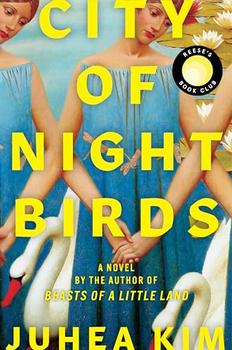Summary | Excerpt | Reading Guide | Reviews | Beyond the Book | Readalikes | Genres & Themes | Author Bio

A Novel
by Juhea Kim
I've always enjoyed the sensation of sliding my legs into fresh sheets, and it is the one comfort I relish even now; but that solace turns quickly to disgust that not much else is left. To forget this fact, I put a Xanax on my tongue and drink from the bottle. When the fizziness floods my mouth, my nerves dull and I feel everything less—my stupidity, my heart, my ankles held together by threadbare tendons.
The sky glows all night like candlelight. Curtains do little to shield the restless violet. After tossing and turning, my eyes open when the room fully brightens. Evidently I've slept in—it is four in the afternoon. An involuntary groan escapes my mouth as I slowly swing my legs out of bed. Although I haven't danced in almost two years, my feet ache like an old woman's when they first land on the floor after waking up. I limp to the shower, leave the light off, and stand still under the hot water. It restores my energy enough that I decide to venture outside. But not enough that I can face Mama.
I slip out of the marble lobby without running into the manager. Summer air in Piter is thicker and sweeter than that in winter—like ice cream compared to iced coffee. It is filled with the scent of flowers, the molecules of water evaporating from the canals, and the orbs of pearly light between the Neva and the sky. People are walking in groups, taking photos and laughing, all their movements slackened as in a slow-motion video, which happens on sun-dappled days in cold countries.
I stop by a café and order a cappuccino to go. Then I walk west along Nevsky Prospekt until it reaches the Neva, flowing lapis blue like the robes of the Virgin in an icon. To the river's right, the lilacs are in full bloom in the Field of Mars. I once spent one of the most beautiful days of my life here, and without closing my eyes I can almost see the shadows of our bodies on the grass.
Not far from where we'd lain, a string quartet is playing Vivaldi's "Stabat Mater." They are probably students at the conservatory, judging by their slightly different variations of white shirt and black pants. A contratenor begins to sing, "Stabat Mater dolorosa, juxta crucem lacrimosa, lacrimosa . . ." The lyrics call to my mind Mama's round face and hands, reddened from rosacea and labor. Her dull espresso hair that turned both limp and airy with age, resembling winter grass. I dwell on her image, willing it to give me peace. Yet the moment I realize I can't remember her voice, my mouth tastes of ashes. After everything I've done to return for Mama, I am not ready to see her.
The singer's voice stills me, keeps me rooted on my achy feet until they finish that song and another piece that I don't recognize. A small crowd gives them a hearty applause that bursts like flowers in the atmosphere. The musicians stand, glowing in the praise, then loosen the hair of their bows, lock up their instruments, and meander away together, hunching under the weight of their hard cases and music stands. Probably on the way to dinner. I realize then that I haven't eaten anything all day. I'm not hungry, but because of the music and the hopefulness from being around happy people, I pull out my phone and text Nina. Because we're now physically close, I feel that my overture after so many years of silence is permitted.
I just flew in last night. If you're free, would you like to get dinner?
I am taken aback and then excited by the three dots that appear, showing she has seen my message and is writing a response.
Natasha! You should've let me know earlier! But I can't—Swan Lake tonight.
Of course, I write back, disappointed as well as relieved. I hadn't checked the Mariinsky schedule—in fact, nothing could convince me to go back to that place or even look up their calendar.
Excerpted from City of Night Birds by Juhea Kim. Copyright © 2024 by Juhea Kim. Excerpted by permission of Ecco. All rights reserved. No part of this excerpt may be reproduced or reprinted without permission in writing from the publisher.
Your guide toexceptional books
BookBrowse seeks out and recommends the best in contemporary fiction and nonfiction—books that not only engage and entertain but also deepen our understanding of ourselves and the world around us.